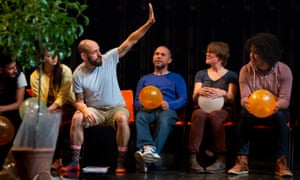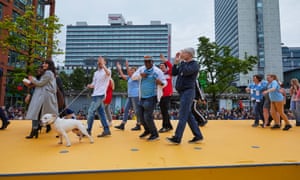On either side of the stage, screens flash up words and phrases. “Accident of birth”, reads one, then it’s “accommodation”, “adrift”, “adversarial” and “afternoon tea”. As we tick through “ah well” and “ancient woodlands”, everyone in the room looks at the performer Jonny Cotsen, who is yomping around the space like a madcap professor. The order of these words is alphabetical, but what on Earth connects them? He looks as cheerfully baffled as the rest of us.
National Theatre Wales’ new show certainly offers some head-scratching questions. Entitled English, it is somewhere between a linguistic puzzle and a collaborative stream of consciousness, a discourse on identity and a piece of ragtag, freeform improvisation. Created with the Manchester-based company Quarantine, it interrogates what we mean by “English”, and whom. Is English something we speak, or something we are? What is “language” anyway? If the answers are tricky to pin down, that might be a reflection of us, too.
The genesis for the piece began 18 months or so ago, soon after NTW’s new artistic director, Kully Thiarai, took up the reins. The EU referendum was not long past; Thiarai was on the hunt for something that could distil the complications of the moment. Language and identity somehow seemed to be at the root of what had just happened. What did it mean to talk English, whether as a new migrant or a so-called “native” speaker? She took the issue to Quarantine’s co-founder Richard Gregory, who is probably best known for directing the joyously inclusive opening to last year’s Manchester international festival, What Is the City But the People? This created a self-portrait of the city – 151 Mancunians of all ages and backgrounds striding down a purpose-built catwalk erected in Piccadilly Gardens.

Quarantine specialises in working with non-professionals and, for English, Gregory and his co-director Renny O’Shea hit upon the idea of spending time at adult education classes. Gregory and his colleagues spoke to refugees and those who needed basic English urgently, along with immigrants applying for citizenship and people doing business courses. “It’s so fascinating in terms of identity,” he says. “People talked about how starting to speak this new language actually transformed them.” Not only did it give insights into how non-speakers grapple with a notoriously labyrinthine tongue, it offered a democratic snapshot of who people trying to find a new life in the UK actually are.
But how to tell the story? It wasn’t until the company were doing auditions in Cardiff that Gregory came across Jonny Cotsen. Cotsen, who was born deaf and grew up in south Wales, had trained as an artist and art teacher, and had recently thrown it all in to do a one-man show about his life. A gifted lip-reader who taught himself to speak, he seemed to add the magic ingredient: someone who could talk about – and talk – English both from the inside and the outside.
The show follows a deceptively simple path. Words from a prearranged lexicon flash up, Cotsen responding to some, throwing others open to us in the crowd. The appearance of “artist” results in Cotsen telling a tale about dragging his flummoxed mum to life-drawing classes (“not what she was expecting”). At the word “adrift”, a man from Pontypridd reveals that when he moved to England in the 1970s, everyone assumed he was from South America, not south Wales.

The conversation often circles around towards issues of belonging (or not). Two first-language Spanish-speakers engage in a vigorous contretemps about how best to translate “escape”. A few moments later, Cotsen shows a silent video captioned as if for someone with hearing difficulties. “BIRDSONG,” one caption reads. “LOUD CAR PASSES,” reads another. Language, but also not quite.
Though everyone in the room identifies as an English-speaker, it quickly becomes clear how multifarious our linguistic inheritance really is. In the room are Punjabi-speakers and Italians, Japanese and Welsh – united, but perhaps also divided, by our common tongue. Only gradually is the central puzzle of the show revealed – that every single word we glimpse, from “Elgar” to “fish and chips”, represents an aspect of Englishness. This is a political as well as emotional lexicon, too. After exactly 90 minutes, a stage manager calls an abrupt halt, somewhere deep in “F”. Tomorrow night, the game will continue.
At times, English seems buried under the weight of all the layers it contains, and, charming though Cotsen is, it could benefit from a firmer sense of direction. But at its sharpest points the show gets at something profound about theatre: that it, too, creates its own language, as individuated as the people who witness and perform it. “You understand?” Cotsen asks repeatedly. Perhaps we do – or at least a little more than when we started.
• English is at Wales Millennium Centre, Cardiff, until 24 June. Box office: 029-2037 1689.